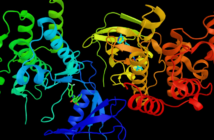New program targets childhood obesity by helping whole families eat healthier.
One in five Rhode Island kids is obese, and a lopsided number of them come from low-income families, according to a recent report.
State health officials and scientists hope to make a dent in that worrisome statistic with a multimillion-dollar grant from the US Centers for Disease Control and Prevention (CDC) to address this childhood health challenge.
“Heading off obesity early on can make all the difference in a child’s long-term health,” says US Senator Sheldon Whitehouse, who worked with the rest of Rhode Island’s congressional delegation to help secure $2.45 million for the community-based program, which will be managed through The Miriam Hospital’s Weight Control and Diabetes Research Center.
Childhood obesity can have immediate and long-term health risks, including type 2 diabetes, asthma, cardiovascular disease, and sleep apnea, the CDC warns.
Elissa Jelalian, PhD, a professor of psychiatry and human behavior at the Warren Alpert Medical School and a senior research scientist at The Miriam, will lead the five-year project, which she hopes will help children and their families eat better, exercise more, and spend less time staring at screens.
Jelalian will evaluate an existing family-based program, JOIN for ME, which teaches parents to be role models for their kids and connects families to community resources that will help the children lose weight and improve their health. She’s recruiting 128 Rhode Island children, ages 6 to 12, for the study.
Most families don’t have access to programs that could help them or their children make healthy lifestyle changes, Jelalian says.
“The most pressing need is in children from low-income families, who are at greatest risk for obesity and least likely to have access to care,” she says. Running the programs out of community settings would make it easier to participate, she adds.
The project builds on the work Jelalian has done with funding from the Hassenfeld Child Health Innovation Institute, which identified healthy weight as one of its three key research initiatives. The institute collaborated with the state Department of Health and other agencies to collect childhood overweight and obesity data for the Rhode Island Kids Count report released in March.
In addition to finding that 20 percent of Rhode Island children ages 2 to 17 are obese, another 15 percent are overweight or at risk for obesity. Kids whose body mass index (BMI) is in the 95th percentile for their gender and age are considered obese, according to CDC guidelines; those with a BMI between the 85th and 95th percentiles are considered overweight.
The Kids Count report also found that 26 percent of children covered by public insurance are obese, compared to 14 percent of those with private health insurance. Researchers uncovered racial disparities as well: 28 percent of Hispanic children and 21 percent of black children were obese, compared to 15 percent of non-Hispanic white kids.
“We want every child to be healthy, regardless of their zip code or family income,” US Senator Jack Reed says. “This federal grant will help … develop improved approaches to childhood obesity prevention and lead to healthier kids and communities.”




